TSHABA’S EYE
Teach us the skills that will give us a second chance in life, say homeless people
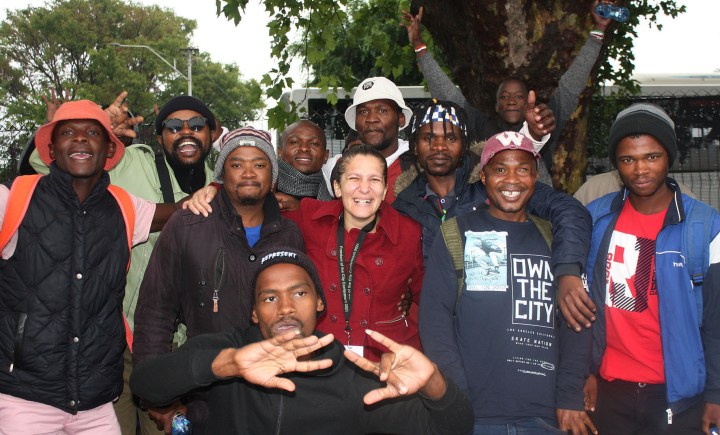
When you are homeless, each and every promise you get gives you hope. There is nothing that breaks a homeless person’s soul like empty promises.
Last week the National Homelessness Network (NHN), supported by the City of Johannesburg and the Gauteng Department of Social Development (DSD), hosted a national conversation on homelessness, at an event that took place over two days at the Brixton Multipurpose Community Centre in inner-city Johannesburg.
Read Mark Heywood’s report on the NHN Conversation here.
‘Homeless but not rights-less’: Call for a humane response to a growing SA crisis
Buses were provided to transport homeless people from the shelter at Kotze Street in Hillbrow to Brixton. It was free!
Small things to you are big things to others.
I was emotional when I saw the happiness on the faces of the homeless people taking a bus trip. Some were dancing outside the shelter when they saw the buses. What touched me the most, was that for many of them it was not just about going to the conversation. It was the happiness of having a few days of freedom. To drive around and see Jozi and forget about the stresses of life on the street.
It was a big therapy.
For once, homeless people were invited to come to talk for themselves. To the homeless people who were present, that too was a cause of happiness, because most of the time NGOs, NPOs and the government come up with the final decisions for homeless people. They say that they will do this and that for them. But they don’t come and ask them: What are their needs? What do they want? What are their challenges?
That is why projects and money go to waste.
We can have thousands of shelters, soup and food kitchens and clothes donations to support the homeless. But by forgetting to ask them what they want, we forget that they too have dreams and wishes.
These beautiful people are happy with all the support they get from the government and other people. But they don’t want handouts. They want to do things by themselves. At the shelters it is all about sleeping and eating, there is no movement forward with regard to fixing their lives.
During the conversation, a special ‘fishbowl’ was created with homeless people on the inside and ‘homeful’ people on the outside, listening to what they had to say.
These were some of the things I heard:
- “People are calling me a hobo, but I’m just a homeless man; I’m not a criminal, I’m a father, I’m someone’s child. I’m just dirty because I don’t have a place to clean myself. I’m not a hijacker, sometimes people should stop their cars and hear my story.”
- “All I need is to be independent to have work, my own place to stay or a home.”
- “Some of the people pass me sitting here and say it to my face that I’m already dead. There is no need to go back home because my sins are following me. I forgive them because they don’t know how difficult it is to get out of this prison called homelessness.”
- “All of us were given names when we arrived in this painful world. No parent can give their children names like Street Kid, Hobo, Homeless. All of us have beautiful names like Hope or David. So if people can give us respect, that will change our lives.”
- “Don’t make me a project, help me to have a second chance. I know I’m nothing to your eyes, but give me a chance to show you my skills.”
One of those present was David Jones from Durban, who stays at the Denis Hurley Centre. He said that at the centre, people of all faiths support the homeless with healthcare, cooked meals, showers, laundry, job training and drug rehab.
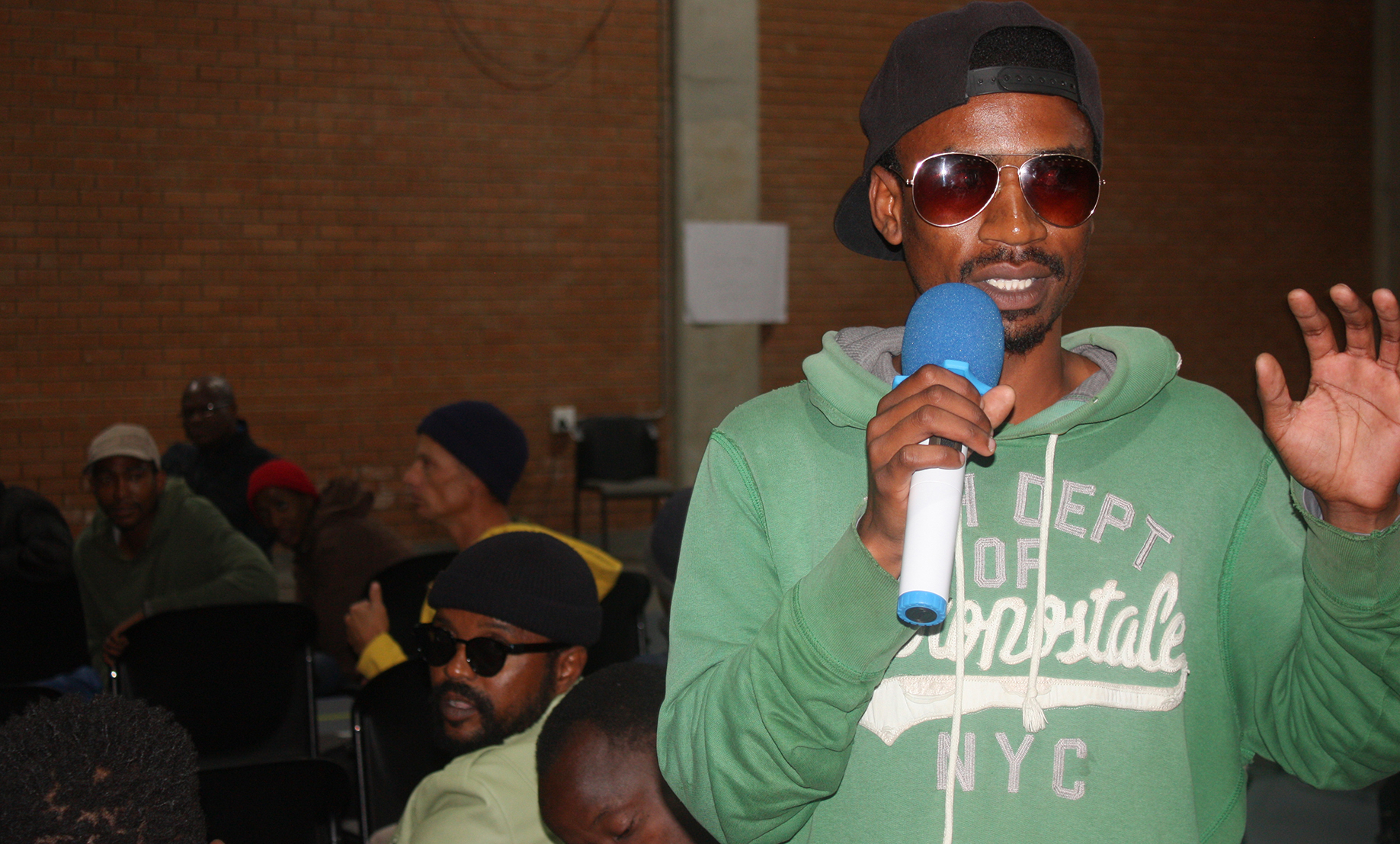
At the National Conversation on Homelessness people, the homeless said they don’t want handouts any more. What they want is centres where they can be rehabilitated. (Photo: Tshabalira Lebakeng )
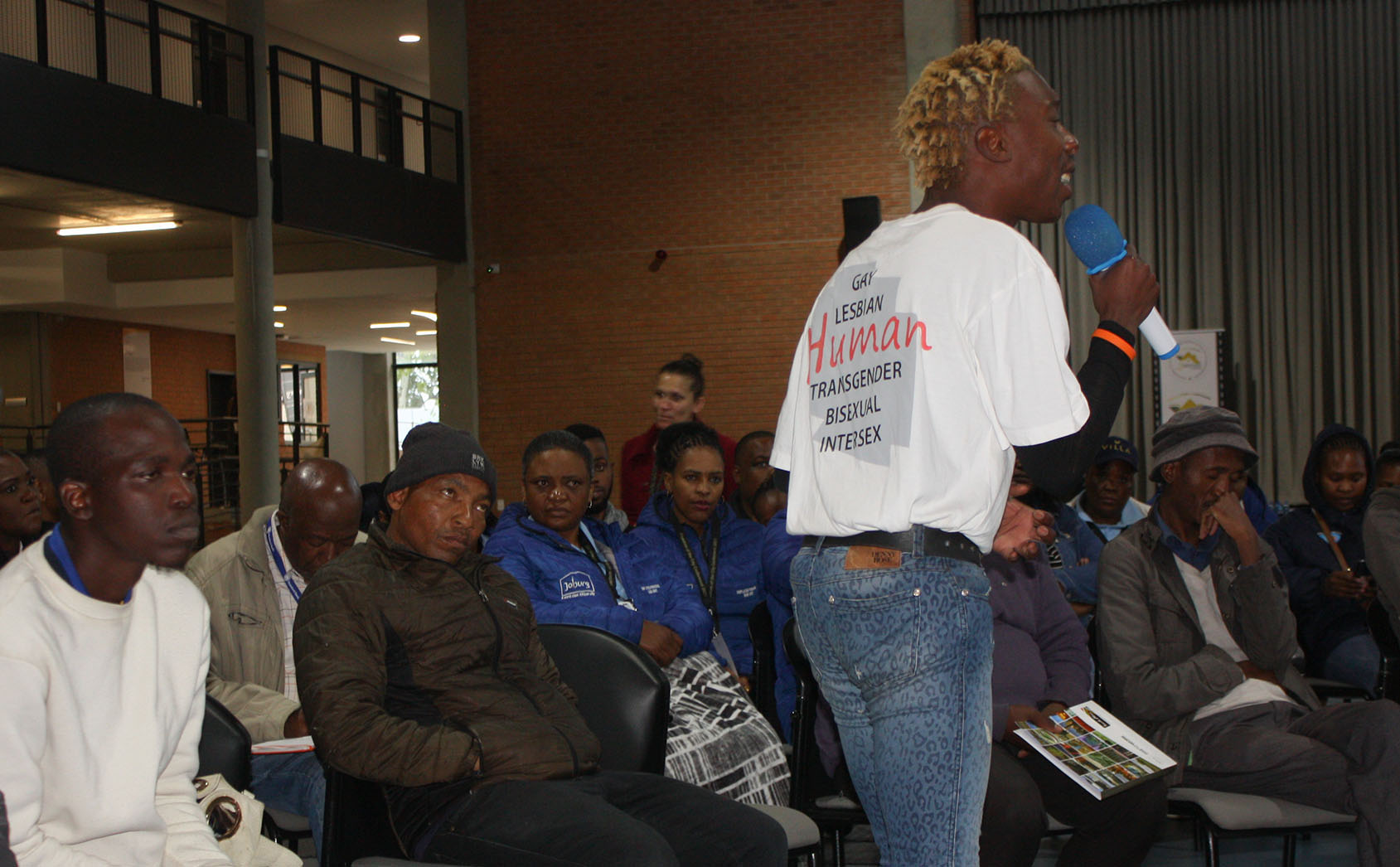
After the National Conversation on Homelessness, people were happy to be part of it and also have hope that their voices are being heard. (Photo: Tshabalira Lebakeng)
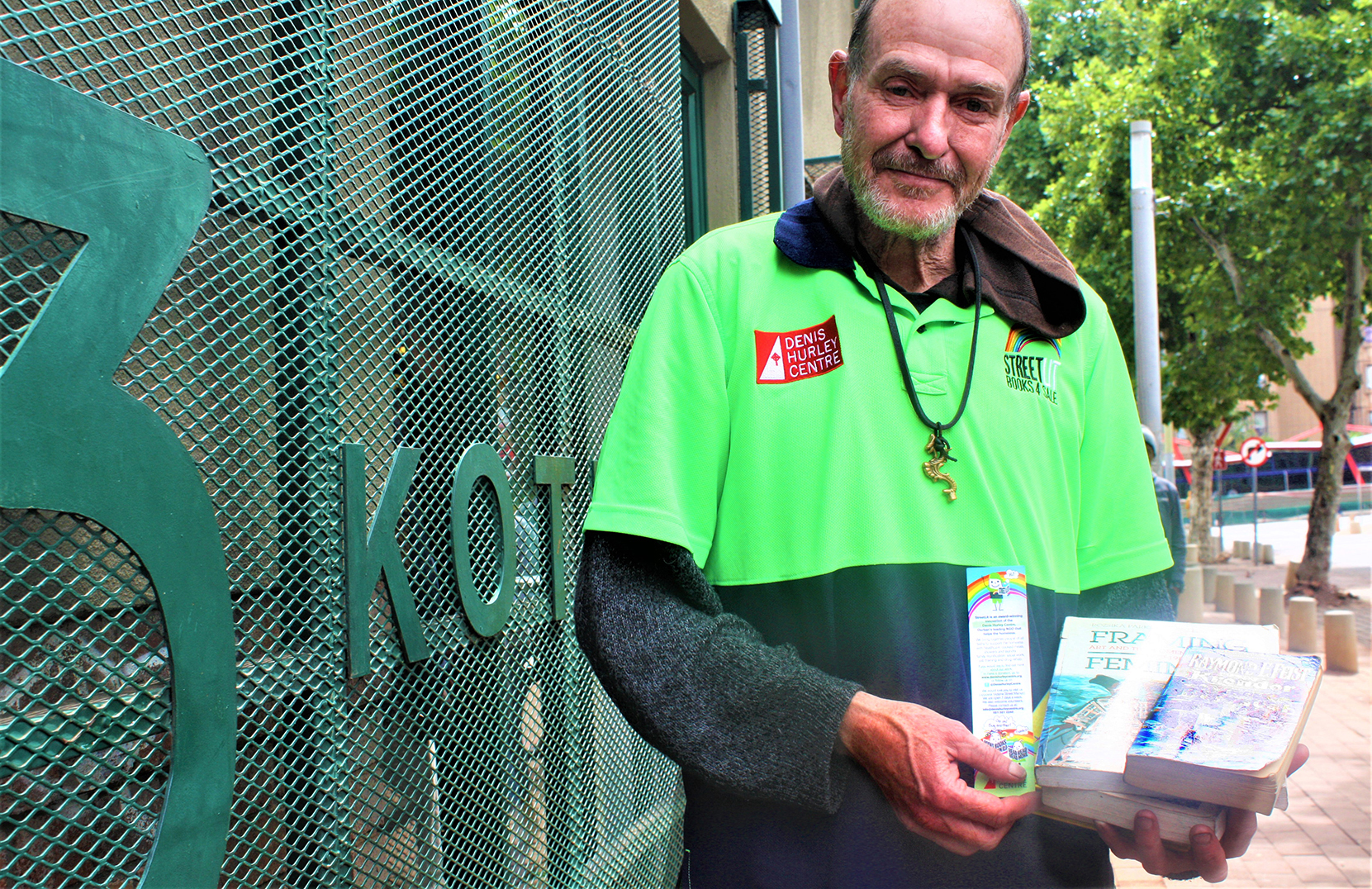
A homeless man says he was a drug addict for years, and felt like he was a nobody in his community. He now sells books on the street. (Photo: Tshabalira Lebakeng)
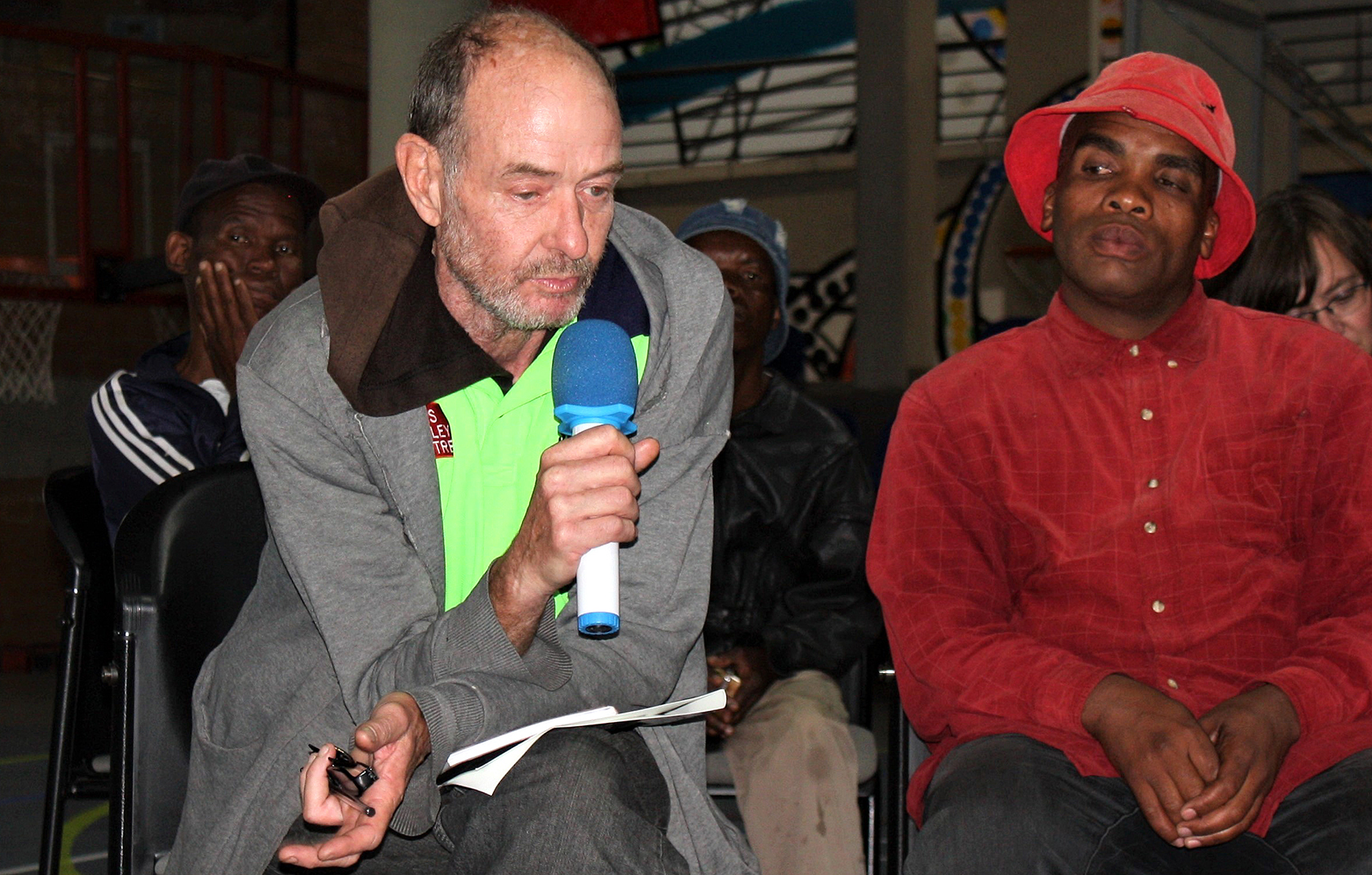
A homeless man says he was a drug addict for years, and dropped out of university. (Photo: Thabalira Lebakeng)
Visit Daily Maverick’s home page for more news, analysis and investigations
Jones said: “I was a drug addict for years. I was nobody, my community didn’t want me. I dropped out from the university, I didn’t know that I’m putting myself in something that won’t be easy to leave. I thought I will smoke drugs for a small period of time. I found out drugs are dangerous and addictive.
“I wish I could bring back the time that I wasted. Now I’m an old man, I have nothing I can do. I’m too old to study. But I’m sober and clean. I don’t do drugs any more.
“At Denis Hurley Centre I got a second chance. I’m in a programme called Street Lit Books 4 Sale. I’m selling the books and the money I get from it is my income. I feel independence is better than having nothing,’’ said Jones.
Jones said if he was still young he would study filmmaking; he would tell stories about real street life, not what is shown on television. “If you are not strong, you will give up and die in the streets.”
Nqobile Dlamini was sitting at the traffic lights next to the community centre in Brixton where the conversation was held.
I told him that homeless people have a chance to tell the government and NGOs what they want and what they need. He said what he needed was a development centre, not a shelter, which is why he sleeps under the trees at Brixton Park.
“I’m from Empangeni, KwaZulu-Natal. Back home, I was a good bricklayer — I can build a house. I came to Jozi, the city of gold, to look for work. But when I get here, things are different. I found out that you can’t build a house without having certificates.
“I found myself struggling to get the job that I dream of. When I got to the shelters, they just gave me a place to sleep and food.
“I wanted a place where I will be trained and develop my skills. I wanted a place where I will get a certificate that will help me to get a job. I can provide myself with food and blankets. What I need, it’s a skills development centre that will help me to use their reference to get a job.’’
Dlamini said that staying at the shelter gives him self-pity, stress and anxiety. He’s not used to getting things for free. He says he has hands, but he can’t find work.
At the conversation, homeless people said they don’t want handouts any more and they don’t need just shelters. They want centres where they will be rehabilitated, as some of them use drugs and they want to stop using drugs. Some said shelters should assist with medical care and psychological counselling as they saw horrible things on the streets. They have skills which include baking, IT, sewing and more.
They said they don’t want to live in shelters for the rest of their lives. Shelters should help people to build their lives. They want centres where you come in, get your skills, and get out and stand up for yourself.
They don’t want to be treated as if being homeless is the end of their lives; they want places that will support, give confidence to and motivate them.
At the conversation, the Gauteng MEC for social development, Mbali Hlophe, said the problem is that homeless people have always been treated as invisible in society.
“No one wants to see homeless people, even when they approach our cars at the robots. We must acknowledge that they exist, and we cannot avoid them.’’
As homeless people, we are living in the hope that one day things will be okay.
Some of us have been rejected by our families and we are betrayed by the people we love. We have been kicked out on to the streets by our own parents and siblings. We don’t want to live under the saying, “Half a loaf is better than nothing.” We want a chance to bake our own bread. Don’t give us a fish, teach us how to catch a fish.
I hope that what was promised in that conversation will happen. Because when you are homeless, each and every promise you get gives you hope. Nothing breaks a homeless person’s soul like empty promises. DM/MC

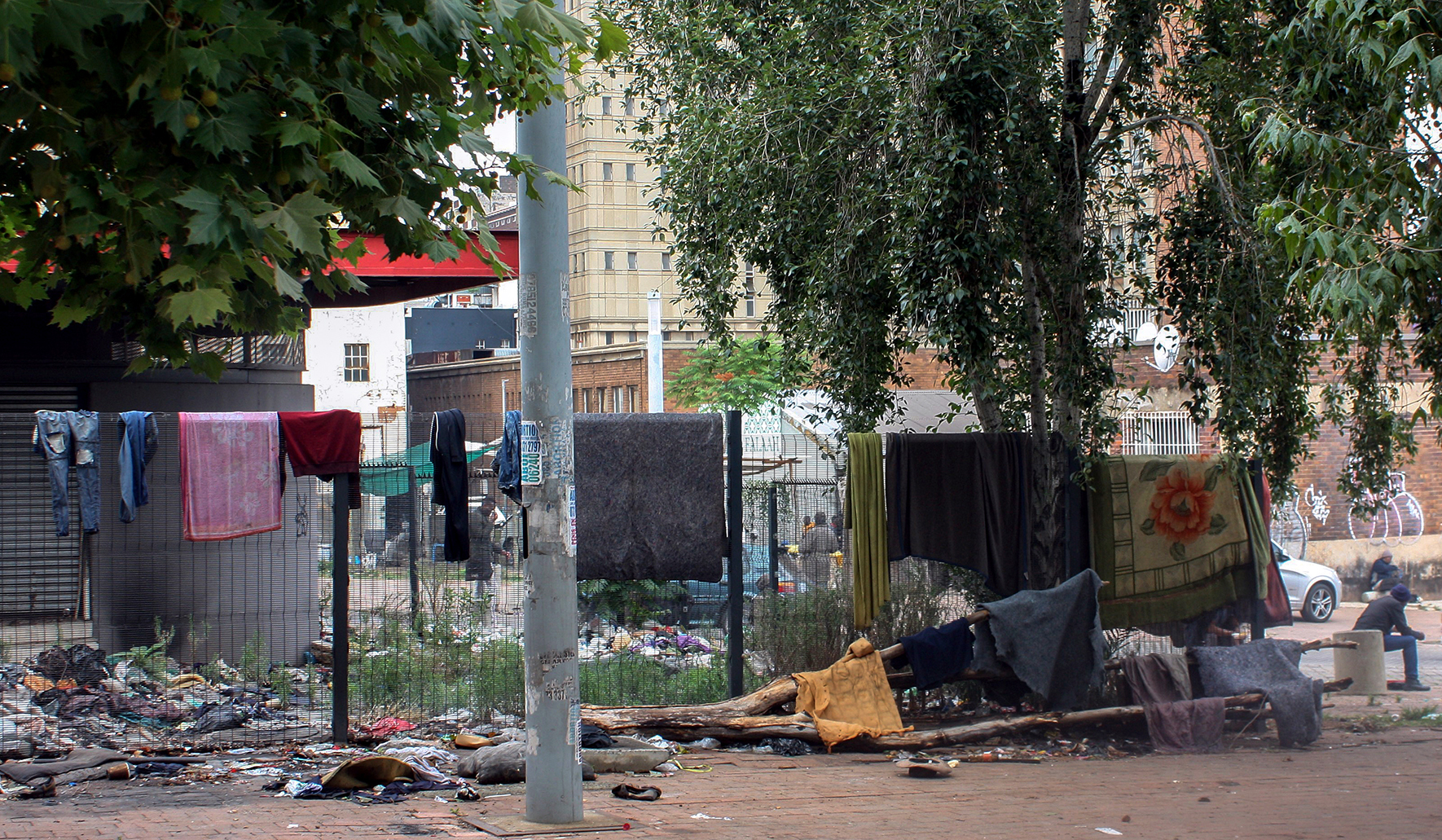



















Comments - Please login in order to comment.